2023年中考复习形容词、副词专项课件(共31张PPT)
文档属性
| 名称 | 2023年中考复习形容词、副词专项课件(共31张PPT) | 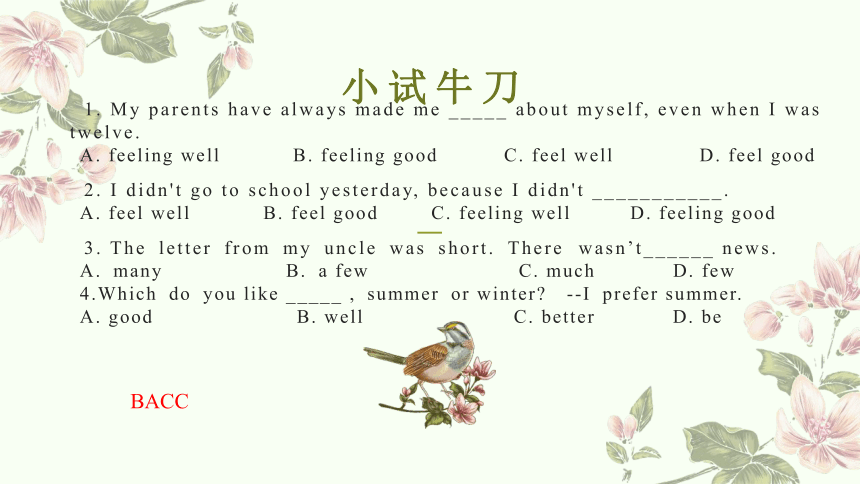 | |
| 格式 | zip | ||
| 文件大小 | 1.8MB | ||
| 资源类型 | 教案 | ||
| 版本资源 | 人教新目标(Go for it)版 | ||
| 科目 | 英语 | ||
| 更新时间 | 2022-08-03 14:16:10 | ||
图片预览

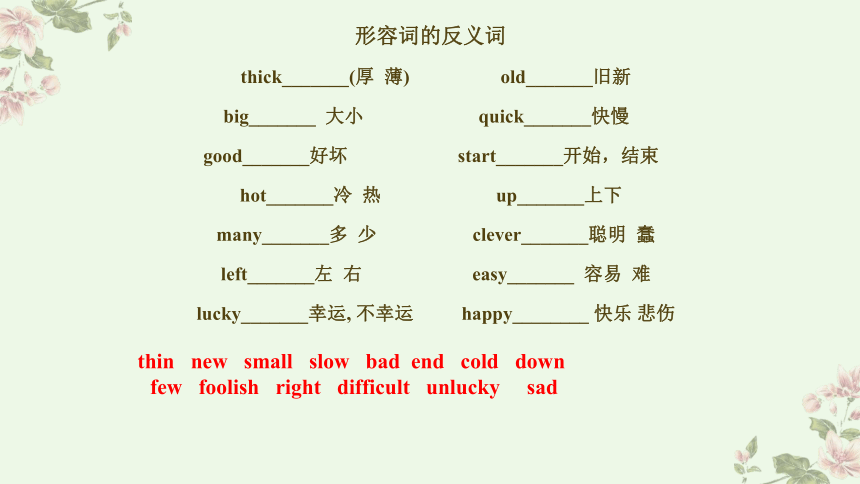

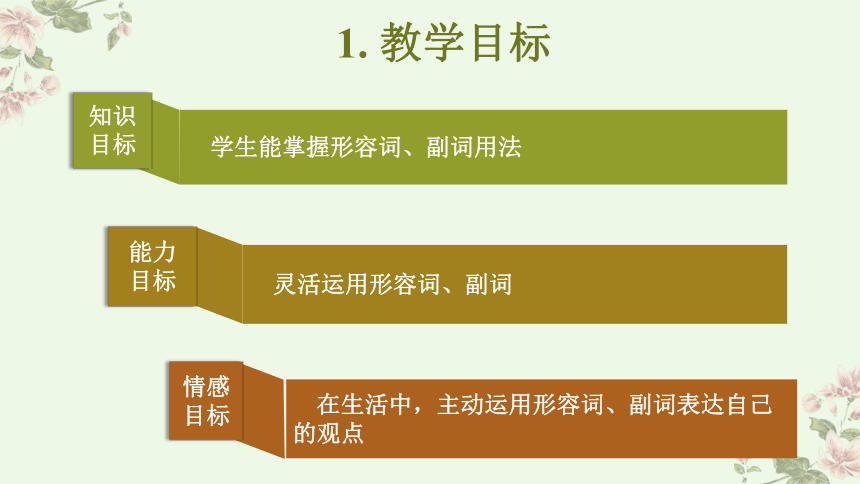
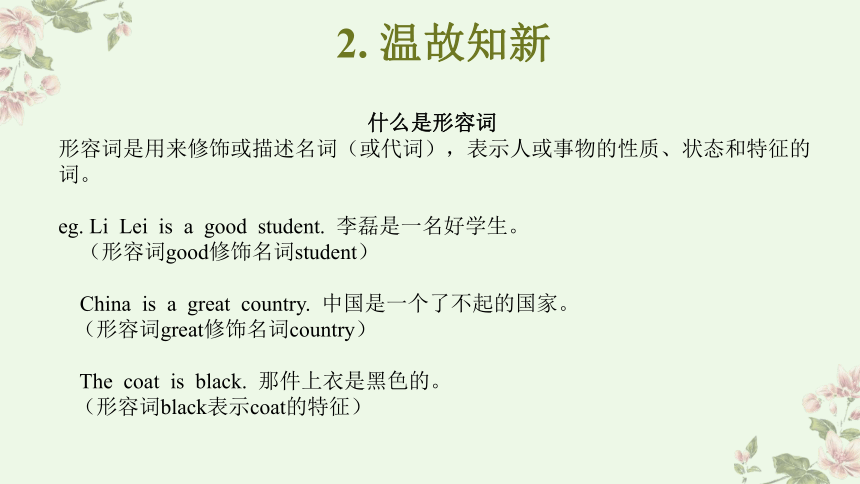
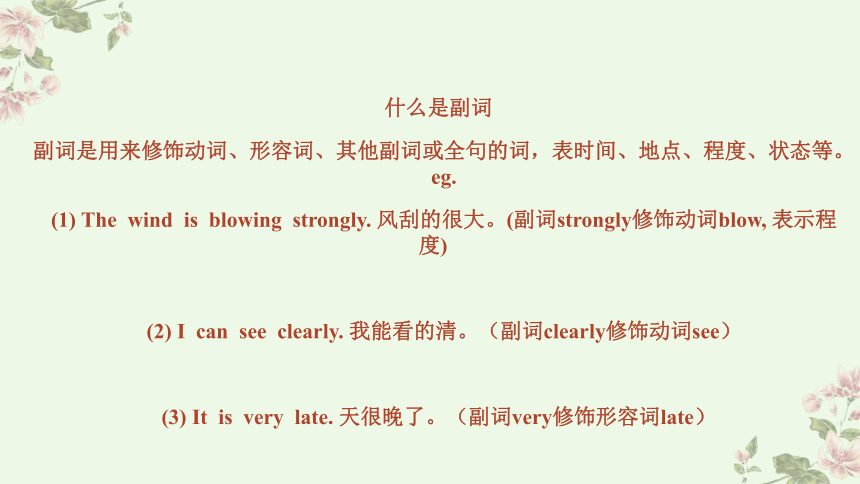

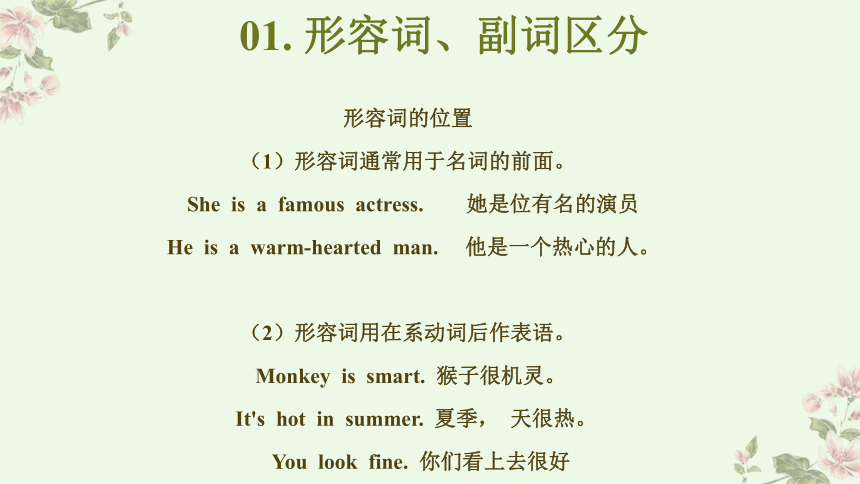
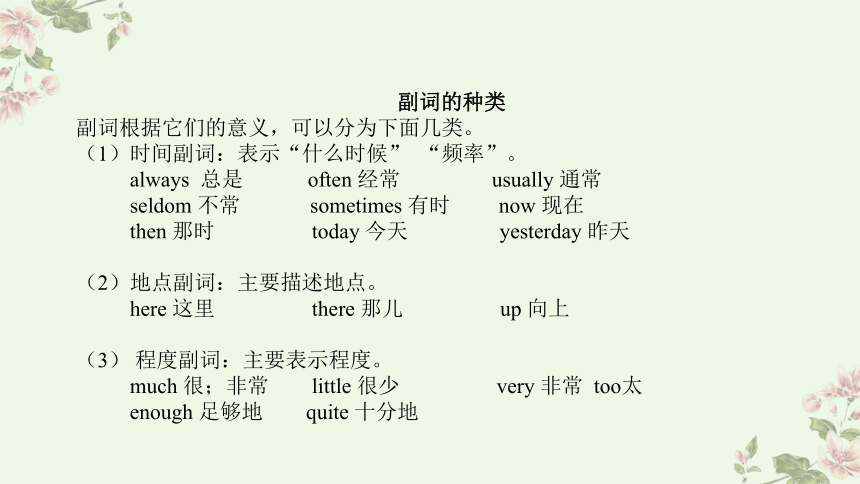
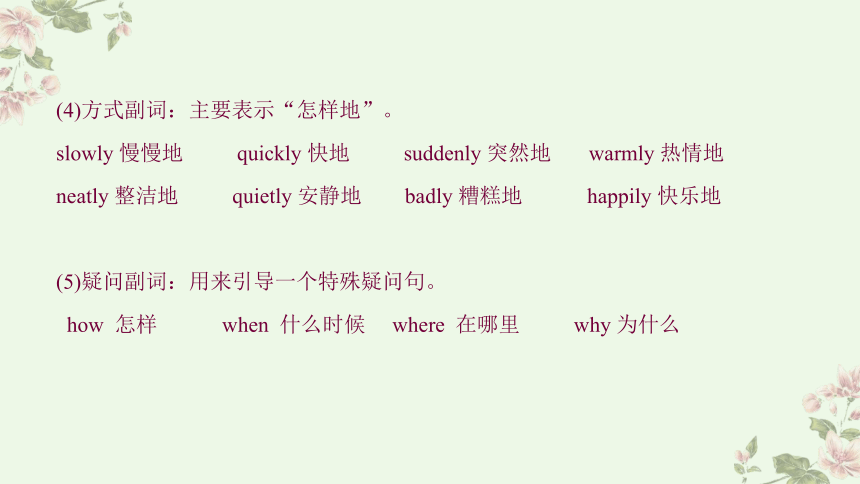
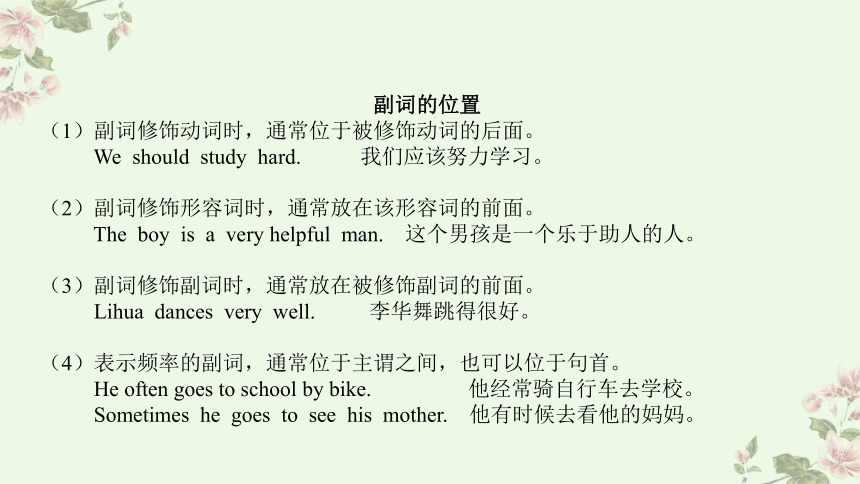
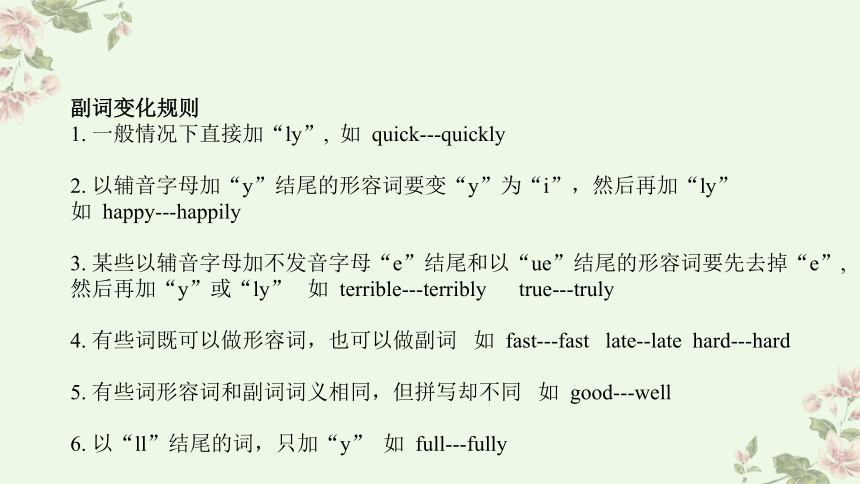
文档简介
(共31张PPT)
小试牛刀
1. My parents have always made me _____ about myself, even when I was twelve.
A. feeling well B. feeling good C. feel well D. feel good
2. I didn't go to school yesterday, because I didn't ___________.
A. feel well B. feel good C. feeling well D. feeling good
3. The letter from my uncle was short. There wasn’t______ news.
A. many B. a few C. much D. few
4.Which do you like _____ , summer or winter --I prefer summer.
A. good B. well C. better D. be
BACC
形容词的反义词
thick_______(厚 薄) old_______旧新
big_______ 大小 quick_______快慢
good_______好坏 start_______开始,结束
hot_______冷 热 up_______上下
many_______多 少 clever_______聪明 蠢
left_______左 右 easy_______ 容易 难
lucky_______幸运, 不幸运 happy________ 快乐 悲伤
thin new small slow bad end cold down
few foolish right difficult unlucky sad
形容词、副词专项
1. 教学目标
学生能掌握形容词、副词用法
知识目标
灵活运用形容词、副词
能力
目标
在生活中,主动运用形容词、副词表达自己的观点
情感目标
2. 温故知新
什么是形容词
形容词是用来修饰或描述名词(或代词),表示人或事物的性质、状态和特征的词。
eg. Li Lei is a good student. 李磊是一名好学生。
(形容词good修饰名词student)
China is a great country. 中国是一个了不起的国家。
(形容词great修饰名词country)
The coat is black. 那件上衣是黑色的。
(形容词black表示coat的特征)
什么是副词
副词是用来修饰动词、形容词、其他副词或全句的词,表时间、地点、程度、状态等。eg.
(1) The wind is blowing strongly. 风刮的很大。(副词strongly修饰动词blow, 表示程度)
(2) I can see clearly. 我能看的清。(副词clearly修饰动词see)
(3) It is very late. 天很晚了。(副词very修饰形容词late)
(4) You speak too quickly. 你说的太快。(副词修饰副词)(副词too修饰副词quickly)
3. 新知讲解
我们快来看看今天有哪些新知识吧
形容词的位置
(1)形容词通常用于名词的前面。
She is a famous actress. 她是位有名的演员
He is a warm-hearted man. 他是一个热心的人。
(2)形容词用在系动词后作表语。
Monkey is smart. 猴子很机灵。
It's hot in summer. 夏季, 天很热。
You look fine. 你们看上去很好
01. 形容词、副词区分
副词的种类
副词根据它们的意义,可以分为下面几类。
(1)时间副词:表示“什么时候” “频率”。
always 总是 often 经常 usually 通常
seldom 不常 sometimes 有时 now 现在
then 那时 today 今天 yesterday 昨天
(2)地点副词:主要描述地点。
here 这里 there 那儿 up 向上
(3) 程度副词:主要表示程度。
much 很;非常 little 很少 very 非常 too太
enough 足够地 quite 十分地
(4)方式副词:主要表示“怎样地”。
slowly 慢慢地 quickly 快地 suddenly 突然地 warmly 热情地
neatly 整洁地 quietly 安静地 badly 糟糕地 happily 快乐地
(5)疑问副词:用来引导一个特殊疑问句。
how 怎样 when 什么时候 where 在哪里 why 为什么
副词的位置
(1)副词修饰动词时,通常位于被修饰动词的后面。
We should study hard. 我们应该努力学习。
(2)副词修饰形容词时,通常放在该形容词的前面。
The boy is a very helpful man. 这个男孩是一个乐于助人的人。
(3)副词修饰副词时,通常放在被修饰副词的前面。
Lihua dances very well. 李华舞跳得很好。
(4)表示频率的副词,通常位于主谓之间,也可以位于句首。
He often goes to school by bike. 他经常骑自行车去学校。
Sometimes he goes to see his mother. 他有时候去看他的妈妈。
副词变化规则
1. 一般情况下直接加“ly”, 如 quick---quickly
2. 以辅音字母加“y”结尾的形容词要变“y”为“i”,然后再加“ly”
如 happy---happily
3. 某些以辅音字母加不发音字母“e”结尾和以“ue”结尾的形容词要先去掉“e”, 然后再加“y”或“ly” 如 terrible---terribly true---truly
4. 有些词既可以做形容词,也可以做副词 如 fast---fast late--late hard---hard
5. 有些词形容词和副词词义相同,但拼写却不同 如 good---well
6. 以“ll”结尾的词,只加“y” 如 full---fully
02. 经典例题
1. These oranges taste ________.
A. good B. well C. to be good D. to be well
2. John was so sleepy that he could hardly keep his eyes ________.
A. open B. to be opened C. to open D. opening
3. She isn' t so _______at maths as you are.
A. well B. good C. better D. best
4. Look! The children are playing________. They are always________.
A. happy; happy B. happily; happily C. happily; happy D. happy; happily
5. We find it ________ to do some reading everyday.
A. easily B. be enjoyable C. helpful D. interested
6. The Internet is really ______to us. We can easily find the information.
A. safe B. hard C. boring D. useful
7. We love to go to the country in spring as the flowers smell so _______.
A. well B. nice C. wonderfully D. nicely
8. This book is very____________ and I am_________ in it.
A. interest; interest B. interesting; interested
C. interested; interesting D. interested; interested
白的
happy 开心的
happily 开心地
quickly快速地
really 真地
beautiful 美丽的
excited 兴奋的
土地
形容词
副词
知识讲解1
beautiful
careful
excited
faSt
happy
形容词
good
hard
副词??
beautifully
carefully
excitedly
happily
faSt
Well
hard
你是否还记得:
形变副的变化规则?
有规则
无规则
直接加ly
以l结尾的加ly
以y结尾的去y为i+ly
good—well
fast—fast
hard—hard
变化规则
ly 结尾的不一定是副词!!!
PART ONE
friendly友好的---a friendly smile友好的微笑
lovely可爱的---a lovely girl一位可爱的姑娘
lively活泼的---a lively child一位活泼的小孩
lonely孤独的---a lonely traveller一位孤独的旅客
likely很可能的---a likely story 煞有介事
silly傻的,无聊的---a silly question愚蠢的问题
daily每日的---daily work日常工作
ugly丑陋的---an ugly duckling 一只丑小鸭
weekly每星期的---a weekly magazine周刊
smell-smelly adj.发臭的, 有臭味的---a smelly gas 难闻的气体
ly结尾的形容词
I am a happy student.
I am happy.
I do my homework quickly.
I am really happy.
用法
1:形容词:放在be动词之后
放在名词前;修饰名词
2:副词:放在动词之后;修饰动词
放在形容词之前;修饰形容词
开心小课堂
一、形容词
形容词修饰名词/不定代词,说明事物或人的性质或特征。一般放所修饰名词前作定语,也可独立作表语/宾补等。
1. 作定语:
① this is an interesting story. ② Kitty is a clever cat.
2. 作表语:
① Yao Ming is very tall. ② Our classroom is big and bright.
3. 作宾补:
① Don't make your hands dirty. ② We're trying to learin English well.
4. 当堂总结
二、以-ly结尾的形容词
1. 大部分形容词加-ly可构成副词。但 friendly,lovely,lonely,lively,仍为形容词。
改错:
(错)She sang lovely. (错)He spoke to me very friendly.
(对)Her singing was lovely. (对)He spoke to me in a very friendly way.
2. 有些以-ly 结尾既为形容词,也为副词。
daily,weekly,monthly,yearly,early
① The Times is a daily paper.
② The Times is published daily.
三、多个形容词修饰名词的顺序
多个形容词修饰名词时,顺序:
限定词--数词--描绘词--(大小,长短,形状,新旧,颜色) --出处--材料性质,类别)
口诀:美小圆旧黄,中国木书房
① a small round table
② a tall gray building a dirty old brown shirt
a famous German medical school an expensive Japanese sports car
副词:
是用来修饰动词、形容词、副词或全句,在句子中作状语或表语的一类词。
分类:
时间副词(now, today, early, sometimes, already等);
地点副词(outside, inside, upstairs, here, there, home等);
方式副词(quickly, loudly, suddenly, fast, luckily等);
程度副词(very, quite, rather, too, much, so等);
疑问副词(when, where, why, how, how long, how often等);
关系副词(when, where, why, how等)
副词的基本用法:
副词是用以修饰动词、形容词、副词以及全句的词,表示时间、地点、方式、程度、
疑问等概念。
1. 作状语:The students watch him quietly . (修饰动词)
2. 作表语:Time is up. Let' s go. (表示状态)
3. 作定语:Life there is very dull. (一般后置)
4. 修饰形容词或副词, 表示程度:
His book is very useful. (修饰形容词)
Henry sings quite well. (修饰副词)
5. 副词作状语时,位置很灵活:
He walks slowly. (动词后) I often swim in summer.(动词前)
That's all right. (形容词前) Tom speaks too quickly.(副词前)
副词的排列顺序:
(1) 时间,地点副词,小单位的在前,大单位在后。
(2) 方式副词,短的在前,长的在后,并用and或but等连词连接。 e Please write slowly and carefully.
(3) 多个不同副词排列:程度+地点+方式+时间副词。
注意:副词very 可以修饰形容词,但不能修饰动词。
改错:(错) I very like English.
(对) I like English very much.
当堂练习
1. He put on his coat and went out ____________ (quick).
2. It's snowing hard. You must drive___________ (careful).
3. They also do _________ (good) at home.
4. Nancy feels _________ (sleep) in the afternoon.
5. He never _________ (go) to work by car.
6. Wang Bing goes to school _________ (early).
7. Can you read it _________ (slow)
8. She looked _________(happy), because she got a gift from her mother.
quickly
carefully
well
sleepy
goes
early
slowly
happy
今晚8点发送作业至群里
5. 家庭作业
Are you ready
winner!!!
小试牛刀
1. My parents have always made me _____ about myself, even when I was twelve.
A. feeling well B. feeling good C. feel well D. feel good
2. I didn't go to school yesterday, because I didn't ___________.
A. feel well B. feel good C. feeling well D. feeling good
3. The letter from my uncle was short. There wasn’t______ news.
A. many B. a few C. much D. few
4.Which do you like _____ , summer or winter --I prefer summer.
A. good B. well C. better D. be
BACC
形容词的反义词
thick_______(厚 薄) old_______旧新
big_______ 大小 quick_______快慢
good_______好坏 start_______开始,结束
hot_______冷 热 up_______上下
many_______多 少 clever_______聪明 蠢
left_______左 右 easy_______ 容易 难
lucky_______幸运, 不幸运 happy________ 快乐 悲伤
thin new small slow bad end cold down
few foolish right difficult unlucky sad
形容词、副词专项
1. 教学目标
学生能掌握形容词、副词用法
知识目标
灵活运用形容词、副词
能力
目标
在生活中,主动运用形容词、副词表达自己的观点
情感目标
2. 温故知新
什么是形容词
形容词是用来修饰或描述名词(或代词),表示人或事物的性质、状态和特征的词。
eg. Li Lei is a good student. 李磊是一名好学生。
(形容词good修饰名词student)
China is a great country. 中国是一个了不起的国家。
(形容词great修饰名词country)
The coat is black. 那件上衣是黑色的。
(形容词black表示coat的特征)
什么是副词
副词是用来修饰动词、形容词、其他副词或全句的词,表时间、地点、程度、状态等。eg.
(1) The wind is blowing strongly. 风刮的很大。(副词strongly修饰动词blow, 表示程度)
(2) I can see clearly. 我能看的清。(副词clearly修饰动词see)
(3) It is very late. 天很晚了。(副词very修饰形容词late)
(4) You speak too quickly. 你说的太快。(副词修饰副词)(副词too修饰副词quickly)
3. 新知讲解
我们快来看看今天有哪些新知识吧
形容词的位置
(1)形容词通常用于名词的前面。
She is a famous actress. 她是位有名的演员
He is a warm-hearted man. 他是一个热心的人。
(2)形容词用在系动词后作表语。
Monkey is smart. 猴子很机灵。
It's hot in summer. 夏季, 天很热。
You look fine. 你们看上去很好
01. 形容词、副词区分
副词的种类
副词根据它们的意义,可以分为下面几类。
(1)时间副词:表示“什么时候” “频率”。
always 总是 often 经常 usually 通常
seldom 不常 sometimes 有时 now 现在
then 那时 today 今天 yesterday 昨天
(2)地点副词:主要描述地点。
here 这里 there 那儿 up 向上
(3) 程度副词:主要表示程度。
much 很;非常 little 很少 very 非常 too太
enough 足够地 quite 十分地
(4)方式副词:主要表示“怎样地”。
slowly 慢慢地 quickly 快地 suddenly 突然地 warmly 热情地
neatly 整洁地 quietly 安静地 badly 糟糕地 happily 快乐地
(5)疑问副词:用来引导一个特殊疑问句。
how 怎样 when 什么时候 where 在哪里 why 为什么
副词的位置
(1)副词修饰动词时,通常位于被修饰动词的后面。
We should study hard. 我们应该努力学习。
(2)副词修饰形容词时,通常放在该形容词的前面。
The boy is a very helpful man. 这个男孩是一个乐于助人的人。
(3)副词修饰副词时,通常放在被修饰副词的前面。
Lihua dances very well. 李华舞跳得很好。
(4)表示频率的副词,通常位于主谓之间,也可以位于句首。
He often goes to school by bike. 他经常骑自行车去学校。
Sometimes he goes to see his mother. 他有时候去看他的妈妈。
副词变化规则
1. 一般情况下直接加“ly”, 如 quick---quickly
2. 以辅音字母加“y”结尾的形容词要变“y”为“i”,然后再加“ly”
如 happy---happily
3. 某些以辅音字母加不发音字母“e”结尾和以“ue”结尾的形容词要先去掉“e”, 然后再加“y”或“ly” 如 terrible---terribly true---truly
4. 有些词既可以做形容词,也可以做副词 如 fast---fast late--late hard---hard
5. 有些词形容词和副词词义相同,但拼写却不同 如 good---well
6. 以“ll”结尾的词,只加“y” 如 full---fully
02. 经典例题
1. These oranges taste ________.
A. good B. well C. to be good D. to be well
2. John was so sleepy that he could hardly keep his eyes ________.
A. open B. to be opened C. to open D. opening
3. She isn' t so _______at maths as you are.
A. well B. good C. better D. best
4. Look! The children are playing________. They are always________.
A. happy; happy B. happily; happily C. happily; happy D. happy; happily
5. We find it ________ to do some reading everyday.
A. easily B. be enjoyable C. helpful D. interested
6. The Internet is really ______to us. We can easily find the information.
A. safe B. hard C. boring D. useful
7. We love to go to the country in spring as the flowers smell so _______.
A. well B. nice C. wonderfully D. nicely
8. This book is very____________ and I am_________ in it.
A. interest; interest B. interesting; interested
C. interested; interesting D. interested; interested
白的
happy 开心的
happily 开心地
quickly快速地
really 真地
beautiful 美丽的
excited 兴奋的
土地
形容词
副词
知识讲解1
beautiful
careful
excited
faSt
happy
形容词
good
hard
副词??
beautifully
carefully
excitedly
happily
faSt
Well
hard
你是否还记得:
形变副的变化规则?
有规则
无规则
直接加ly
以l结尾的加ly
以y结尾的去y为i+ly
good—well
fast—fast
hard—hard
变化规则
ly 结尾的不一定是副词!!!
PART ONE
friendly友好的---a friendly smile友好的微笑
lovely可爱的---a lovely girl一位可爱的姑娘
lively活泼的---a lively child一位活泼的小孩
lonely孤独的---a lonely traveller一位孤独的旅客
likely很可能的---a likely story 煞有介事
silly傻的,无聊的---a silly question愚蠢的问题
daily每日的---daily work日常工作
ugly丑陋的---an ugly duckling 一只丑小鸭
weekly每星期的---a weekly magazine周刊
smell-smelly adj.发臭的, 有臭味的---a smelly gas 难闻的气体
ly结尾的形容词
I am a happy student.
I am happy.
I do my homework quickly.
I am really happy.
用法
1:形容词:放在be动词之后
放在名词前;修饰名词
2:副词:放在动词之后;修饰动词
放在形容词之前;修饰形容词
开心小课堂
一、形容词
形容词修饰名词/不定代词,说明事物或人的性质或特征。一般放所修饰名词前作定语,也可独立作表语/宾补等。
1. 作定语:
① this is an interesting story. ② Kitty is a clever cat.
2. 作表语:
① Yao Ming is very tall. ② Our classroom is big and bright.
3. 作宾补:
① Don't make your hands dirty. ② We're trying to learin English well.
4. 当堂总结
二、以-ly结尾的形容词
1. 大部分形容词加-ly可构成副词。但 friendly,lovely,lonely,lively,仍为形容词。
改错:
(错)She sang lovely. (错)He spoke to me very friendly.
(对)Her singing was lovely. (对)He spoke to me in a very friendly way.
2. 有些以-ly 结尾既为形容词,也为副词。
daily,weekly,monthly,yearly,early
① The Times is a daily paper.
② The Times is published daily.
三、多个形容词修饰名词的顺序
多个形容词修饰名词时,顺序:
限定词--数词--描绘词--(大小,长短,形状,新旧,颜色) --出处--材料性质,类别)
口诀:美小圆旧黄,中国木书房
① a small round table
② a tall gray building a dirty old brown shirt
a famous German medical school an expensive Japanese sports car
副词:
是用来修饰动词、形容词、副词或全句,在句子中作状语或表语的一类词。
分类:
时间副词(now, today, early, sometimes, already等);
地点副词(outside, inside, upstairs, here, there, home等);
方式副词(quickly, loudly, suddenly, fast, luckily等);
程度副词(very, quite, rather, too, much, so等);
疑问副词(when, where, why, how, how long, how often等);
关系副词(when, where, why, how等)
副词的基本用法:
副词是用以修饰动词、形容词、副词以及全句的词,表示时间、地点、方式、程度、
疑问等概念。
1. 作状语:The students watch him quietly . (修饰动词)
2. 作表语:Time is up. Let' s go. (表示状态)
3. 作定语:Life there is very dull. (一般后置)
4. 修饰形容词或副词, 表示程度:
His book is very useful. (修饰形容词)
Henry sings quite well. (修饰副词)
5. 副词作状语时,位置很灵活:
He walks slowly. (动词后) I often swim in summer.(动词前)
That's all right. (形容词前) Tom speaks too quickly.(副词前)
副词的排列顺序:
(1) 时间,地点副词,小单位的在前,大单位在后。
(2) 方式副词,短的在前,长的在后,并用and或but等连词连接。 e Please write slowly and carefully.
(3) 多个不同副词排列:程度+地点+方式+时间副词。
注意:副词very 可以修饰形容词,但不能修饰动词。
改错:(错) I very like English.
(对) I like English very much.
当堂练习
1. He put on his coat and went out ____________ (quick).
2. It's snowing hard. You must drive___________ (careful).
3. They also do _________ (good) at home.
4. Nancy feels _________ (sleep) in the afternoon.
5. He never _________ (go) to work by car.
6. Wang Bing goes to school _________ (early).
7. Can you read it _________ (slow)
8. She looked _________(happy), because she got a gift from her mother.
quickly
carefully
well
sleepy
goes
early
slowly
happy
今晚8点发送作业至群里
5. 家庭作业
Are you ready
winner!!!
同课章节目录
- 词法
- 名词
- 动词和动词短语
- 动词语态
- 动词时态
- 助动词和情态动词
- 非谓语动词
- 冠词
- 代词
- 数词和量词
- 形容词副词及其比较等级
- 介词和介词短语
- 连词和感叹词
- 构词法
- 相似、相近词比较
- 句法
- 陈述句
- 一般疑问句和否定疑问句
- 特殊疑问句及选择疑问句
- 反意疑问句
- 存在句(There be句型)
- 宾语从句
- 定语从句
- 状语从句
- 主谓一致问题
- 简单句
- 并列句
- 复合句
- 主谓一致
- 主、表语从句
- 名词性从句
- 直接引语和间接引语
- 虚拟语气
- 感叹句
- 强调句
- 倒装句
- 祈使句
- 句子的成分
- 句子的分类
- 题型专区
- 单项选择部分
- 易错题
- 完形填空
- 阅读理解
- 词汇练习
- 听说训练
- 句型转换
- 补全对话
- 短文改错
- 翻译
- 书面表达
- 任务型阅读
- 语法填空
- 其他资料
